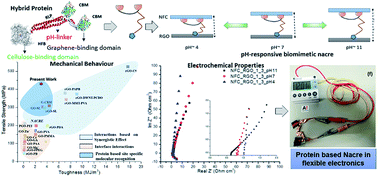Genetically engineered protein based nacre-like nanocomposites with superior mechanical and electrochemical performance†
Abstract
The molecular engineering of proteins at the atomistic scale with specific material binding units and the introduction of designed functional-linkers provides a unique approach to fabricate genetically modified high performance and responsive biomimetic composites. This work is inspired by a tough biological material, nacre, which possesses a hierarchical ‘brick-mortar’ architecture containing multifunctional soft organic molecules, which plays a significant role in improved mechanical properties of composites. A bio-inspired composite, using a resilin-based hybrid protein polymer with selective binding motifs for reduced graphene oxide (RGO) and nanofibrillated cellulose (NFC), was developed. The adhesive and elastic domains of fusion proteins show a synergistic effect with improvement in both the strength and toughness of synthetic nacre. We observed that the hybrid protein could act as a spacer molecule tuning the ion sorption and transport across the inter-layers of NFC/RGO depending on the processing conditions. Interestingly, the protein complexed freestanding solid-state films showed negligible internal resistance and improved supercapacitance suitable for flexible electronic devices. The protein-mediated binding of NFC and RGO reduces the resistance arising from poor electrode/electrolyte interfaces, which is difficult to achieve through conventional routes. The current biosynthetic route for engineering proteins provides a novel prospect to develop materials programmed with desired properties, depending on target applications.



 Please wait while we load your content...
Please wait while we load your content...